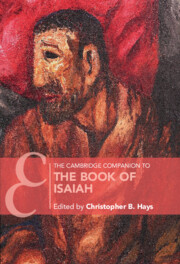Book contents
- The Cambridge Companion to the Book of Isaiah
- Frontispiece
- Cambridge Companions to Religion
- The Cambridge Companion to the Book of Isaiah
- Copyright page
- Contents
- Notes on Contributors
- Acknowledgments
- Timeline of Events Related to the Book of Isaiah
- Abbreviations
- Maps
- 1 Introduction
- Part I The Book of Isaiah Through History
- 2 The Book of Isaiah in the Neo-Assyrian Period
- 3 The Book of Isaiah and the Neo-Babylonian Period
- 4 The Book of Isaiah in the Persian Period
- 5 The Book of Isaiah at Qumran
- 6 Early Versions of Isaiah as Translations and Interpretations
- 7 The Formation of the Book of Isaiah
- Part II Isaiah in Its Cultural World
- Part III Isaiah as Literature
- Part IV Afterlives of the Book of Isaiah
- Scripture Index
- Other Texts Index
- Subject Index
- Cambridge Companions to Religion ()
- References
6 - Early Versions of Isaiah as Translations and Interpretations
from Part I - The Book of Isaiah Through History
Published online by Cambridge University Press: 08 November 2024
- The Cambridge Companion to the Book of Isaiah
- Frontispiece
- Cambridge Companions to Religion
- The Cambridge Companion to the Book of Isaiah
- Copyright page
- Contents
- Notes on Contributors
- Acknowledgments
- Timeline of Events Related to the Book of Isaiah
- Abbreviations
- Maps
- 1 Introduction
- Part I The Book of Isaiah Through History
- 2 The Book of Isaiah in the Neo-Assyrian Period
- 3 The Book of Isaiah and the Neo-Babylonian Period
- 4 The Book of Isaiah in the Persian Period
- 5 The Book of Isaiah at Qumran
- 6 Early Versions of Isaiah as Translations and Interpretations
- 7 The Formation of the Book of Isaiah
- Part II Isaiah in Its Cultural World
- Part III Isaiah as Literature
- Part IV Afterlives of the Book of Isaiah
- Scripture Index
- Other Texts Index
- Subject Index
- Cambridge Companions to Religion ()
- References
Summary
Some of the earliest witnesses to the Book of Isaiah are translations into Greek and Syriac. Sometimes the translators offered not simply basic equivalents to Hebrew words but shaped their translation of passages to accord with understandings of them that were current in their Jewish communities. Although this can make the window to their Hebrew text opaque, sometimes their differences from today’s standard Hebrew text preserve alternative wordings found elsewhere in early Hebrew texts, while in other cases they include wordings that have not survived in any other Hebrew witnesses. The chief question such differences raise is whether the translator tailored his version to the readers’ pre-understanding or if they reflect different Hebrew words in the manuscript he used. In “Early Versions of Isaiah as Translations and Interpretations,” Ronald L. Troxel cites examples of these conundrums, and illustrates how scholars attempt to reason about their origins.
- Type
- Chapter
- Information
- The Cambridge Companion to the Book of Isaiah , pp. 81 - 99Publisher: Cambridge University PressPrint publication year: 2024

